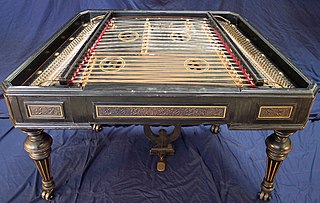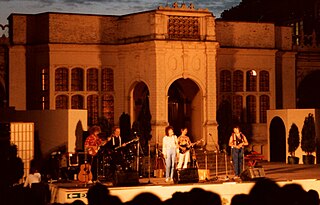Related Research Articles

The hammered dulcimer is a percussion-stringed instrument which consists of strings typically stretched over a trapezoidal resonant sound board. The hammered dulcimer is set before the musician, who in more traditional styles may sit cross-legged on the floor, or in a more modern style may stand or sit at a wooden support with legs. The player holds a small spoon-shaped mallet hammer in each hand to strike the strings. The Graeco-Roman dulcimer derives from the Latin dulcis (sweet) and the Greek melos (song). The dulcimer, in which the strings are beaten with small hammers, originated from the psaltery, in which the strings are plucked.

A percussion instrument is a musical instrument that is sounded by being struck or scraped by a beater including attached or enclosed beaters or rattles struck, scraped or rubbed by hand or struck against another similar instrument. Excluding zoomusicological instruments and the human voice, the percussion family is believed to include the oldest musical instruments.

The cimbalom is a type of chordophone composed of a large, trapezoidal box with metal strings stretched across its top. It is a musical instrument commonly found in the group of Central-Eastern European nations and cultures, namely contemporary Hungary, Slovakia, Czech Republic, Serbia, Croatia, Romania, Moldova, Ukraine, Belarus, Poland, and in the traditional instrumental music of East European Jews throughout most of that territory. It is also popular in Greece and in Romani music. The cimbalom is (typically) played by striking two beaters against the strings. The steel treble strings are arranged in groups of 4 and are tuned in unison. The bass strings which are over-spun with copper, are arranged in groups of 3 and are also tuned in unison. The Hornbostel–Sachs musical instrument classification system registers the cimbalom with the number 314.122-4,5. Moreover, the instrument name “cimbalom” also denotes earlier, smaller versions of the cimbalom, and folk cimbaloms, of different tone groupings, string arrangements, and box types.
Old-time music is a genre of North American folk music. It developed along with various North American folk dances, such as square dancing, clogging, and buck dancing. It is played on acoustic instruments, generally centering on a combination of fiddle and plucked string instruments, most often the banjo, guitar, and mandolin.

The Appalachian dulcimer is a fretted string instrument of the zither family, typically with three or four strings, originally played in the Appalachian region of the United States. The body extends the length of the fingerboard, and its fretting is generally diatonic.

12 Girls Band are an all female Chinese musical group that initially consisted of twelve members before the addition of a thirteenth. Twelve Girls Band use traditional Chinese instruments to play both traditional Chinese and Western music. Formed on June 18, 2001, the women were selected by audition from more than 4,000 contestants. Each woman is classically-trained, and the band members come from various conservatories in the People's Republic of China (PRC), including the China Academy of Music, the Chinese National Orchestra, and the Central Conservatory of Music.

Jean Ruth Ritchie was an American folk singer, songwriter, and Appalachian dulcimer player, called by some the "Mother of Folk". In her youth she learned hundreds of folk songs in the traditional way, many of which were Appalachian variants of centuries old British and Irish songs, including dozens of Child Ballads. In adulthood, she shared these songs with wide audiences, as well as writing some of her own songs using traditional foundations. She is ultimately responsible for the revival of the Appalachian dulcimer, the traditional instrument of her community, which she popularized by playing the instrument on her albums and writing tutorial books. She also spent time collecting folk music in the United States and in Britain and Ireland, in order to research the origins of her family songs and help preserve traditional music. She inspired a wide array of musicians, including Bob Dylan, Joan Baez, Shirley Collins, Joni Mitchell, Emmylou Harris and Judy Collins.

John McCutcheon is an American folk music singer-songwriter and multi-instrumentalist who has produced 41 albums since the 1970s. He is regarded as a master of the hammered dulcimer, and is also proficient on many other instruments including guitar, banjo, autoharp, mountain dulcimer, fiddle, and Jew's harp. He has received six Grammy Award nominations.

The Albion Band, also known as The Albion Country Band, The Albion Dance Band, and The Albion Christmas Band, were a British folk rock band, originally brought together and led by musician Ashley Hutchings. Generally considered one of the most important groupings in the genre, it has contained or been associated with a large proportion of major English folk performers in its long and fluid history.

"I Wonder as I Wander" is a Christian folk hymn, typically performed as a Christmas carol, written by American folklorist and singer John Jacob Niles. The hymn has its origins in a song fragment collected by Niles on July 16, 1933.
Paul Van Arsdale was an American hammered dulcimer player from North Tonawanda in upstate New York.

No Roses is an album by Shirley Collins and the Albion Country Band. It was recorded at Sound Techniques, and Air Studios in London, in the summer of 1971. It was produced by Sandy Roberton and Ashley Hutchings. It was released in October 1971 on the Pegasus label.

Cathy Fink & Marcy Marxer are a musical duo who perform folk, bluegrass and children’s music. They have performed with Pete Seeger, Theodore Bikel, Tom Paxton, Patsy Montana, Riders in the Sky and others. The Washington Area Music Association has recognized the duo with over 60 Wammie Awards for folk, bluegrass, and children’s music.

Emory Brace Remington (1892–1971) was a trombonist and music teacher. His unique method made him one of the most well-known and influential trombone educators in history. He was a member of the Rochester Philharmonic Orchestra from 1923 to 1949, and on the faculty of the Eastman School of Music in Rochester, NY from 1922 until his death in 1971.

Kamran N. Ince is a Turkish-American composer. He is the winner of many prestigious awards, including a Rome Prize, a Guggenheim Fellowship, the Lili Boulanger Memorial Prize, and various others. His work has been performed by the Chicago Symphony Orchestra, the BBC Symphony Orchestra, the Prague Symphony Orchestra, the Los Angeles Piano Quartet, the Borusan Istanbul Philharmonic Orchestra, the Netherlands Wind Ensemble, the Milwaukee Opera Theatre, the Arkas Trio, Evelyn Glennie, Lily Afshar, and others, and his recordings can be found on Naxos, EMI, Albany, and Archer Records. He is known today as one of the leading composers of contemporary music.
Maggie Sansone is a hammered dulcimer player and recording artist from Miami, Florida.
Traditional Thai musical instruments are the musical instruments used in the traditional and classical music of Thailand. They comprise a wide range of wind, string, and percussion instruments played by both the Thai majority as well as the nation's ethnic minorities.

Tulipan was a Brisbane-based Hungarian fusion band who were active from 1993 to 2000.
Virag Antal, founder of the group, learned to play the traditional folk instruments hurdy-gurdy, zither and cimbalom or hammered dulcimer while at school in Hungary. She started the group in 1993 at the Queensland Conservatorium of Music among fellow students as a project. Before long the group started receiving requests to play at venues such as the indie-music nightclub The Zoo in Brisbane.

Manoochehr Sadeghi is a Persian-American naturalized citizen, born in Tehran, Iran. He is considered a Grandmaster or Ostad of the santur, a Persian hammered dulcimer. He has been lecturing, teaching, recording and performing Persian classical music on the santur professionally for over 50 years. In 2002, Sadeghi received the Durfee Foundation Master Musician Award and he is a recipient of a 2003 National Heritage Fellowship from the National Endowment of the Arts, which is the United States' highest honor in the folk and traditional arts.
Dorothy Carter was an American musician. Carter performed contemporary, folk, traditional, medieval, and experimental music with a large collection of stringed instruments such as the hammered dulcimer, zither, psaltery, and hurdy-gurdy. She is regarded as an important figure in the genres of psychedelic folk music and medieval music revival.
References
- ↑ Nowell by Mitzie Collins, Roxanne Ziegler & Glennda Dove on iTunes , retrieved 2021-01-12
- ↑ "Sounds Like Fun - Mitzie Collins and Friends". www.samplercd.com. Retrieved 2021-01-12.